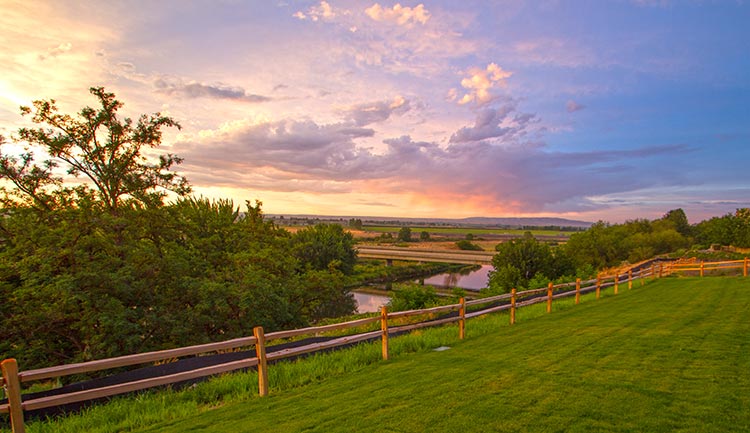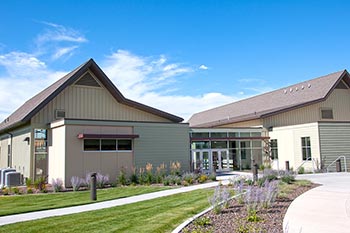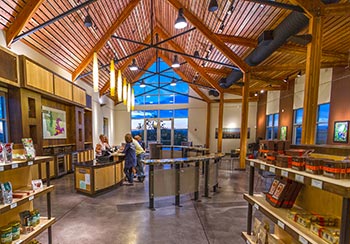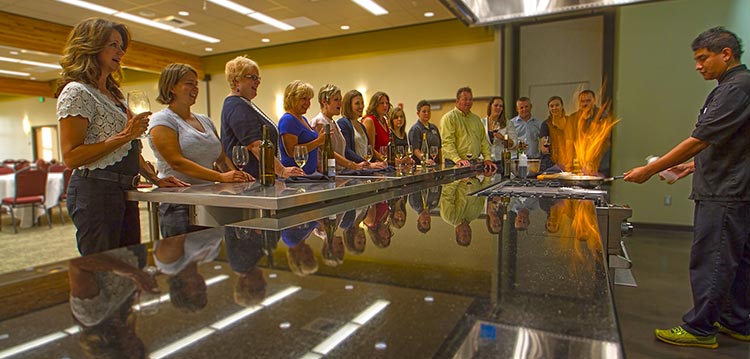Taste wines from different appellations at the Walter Clore Wine & Culinary Center, a showcase for Washington wine and tribute to the Father of Washington Wine

NESTLED in the center of the Yakima Valley, atop 16 acres overlooking the Yakima River, the Walter Clore Wine and Culinary Center is immersed in the wine industry. The center, which opened its tasting room to the public in 2014, features wine from all 13 Washington American Viticultural Areas (AVA).
“We help people understand different regions and why we have different AVAs,” says executive director, Abbey Cameron. “We’re here to be a showcase for Washington wine.”
Named after the late Dr. Walter Clore, whom the state legislature officially recognized as the “Father of Washington Wine,” the center was erected in Prosser where Dr. Clore lived and worked most of his life. The 15,000-square-foot building sits adjacent to Desert Wind Winery and is a short walk from 14 Hands Winery. Despite the close proximity to its neighbors, the center supports all wineries, acting like a visitors’ bureau for wineries from Puget Sound to the Columbia Valley.
“If you’re a well-seasoned Washington wine taster, you can probably find something here that you haven’t had before because we really make an effort to find offerings from across the state,” says Cameron. “Because our wines change so frequently and we’re bringing in wines from near and far, we’re also a great place for new industry folks to visit,” she adds.
Revolving wine tastings
Each month, the center features a different AVA (or other category, i.e. student-made wines or single varietals) using a not-so-scientific method. “We didn’t want to get into any politics or who gets the prime months, so we literally draw months out of a hat,” Cameron says with a laugh.

Once the months are divvied up, the center gets to work contacting wineries within the AVAs. This past July was dedicated to wine grapes that originated from Horse Heaven Hills vineyards, and August belonged to Naches Heights and Snipes Mountain. As long as the grapes are from the AVA-of-the-month, the center will consider featuring it.
“Purple Star Wines, for example, has a tasting room near the Red Mountain AVA; however, the owners, Kyle and Amy Johnson, purchased grapes from another viticultural area to create their 2013 Sauvignon Blanc. When we were getting ready to feature wines from Ancient Lakes, we discovered them,” says Cameron, who added that finding a unique tale about a bottle or the winery itself is part of the selection process. “We love to tell that story. Grapes go all over the state.”
A panel samples the wines and reads through stories, picking about a dozen to showcase each month. The Center purchases the wine for pouring, as well as to sell in the tasting room. Cameron stressed that the wine is sold at the same price as it is at the wineries so as not to undercut the businesses they’re trying to promote.

“We want people to have an experience here and an experience there. We just act like an extension of their tasting room for that month,” she says. “There are really lovely small family wineries in the Columbia Gorge we just featured a few months ago, and they’re only producing 40 or 50 cases. You wouldn’t really find them unless you went to that tasting room, but we can be another place for people to find them, and hopefully create more fans and folks that will visit them.”
The featured wineries are also invited to visit the center to participate in Winemaker Saturdays, a weekly event, where winemakers pour and interact with visitors to share their story firsthand.
What else is cooking
True to its name, the Walter Clore Center takes visitors beyond the wine tasting experience. Divided by a courtyard, the U-shaped building has two designated areas. The west wing houses the tasting room and, beyond the bar, an eating area where small plates are served daily. Items include a cheese trio, creamy garlic herbed boursin and savory toasted nuts.
On Friday, Saturday and Sunday, customers can also choose from the Fresh Fare menu. Chukar Cherry barbecue pulled pork flatbread and heirloom caprese salad have been featured selections, but chef Kristin Martilla Johnson changes items mid-month to reflect what’s local, seasonal and fresh.
Customers can eat outdoors, but the summer’s triple-digit-temperatures often keep people inside. Vaulted ceilings and natural light compliment the room’s earth tones, including the plush eggplant-colored chairs Scott Pontin helped pick out.
Pontin is the owner of Pontin Del Roza and has served on the board of directors since the center’s inception. He was part of the design committee and helped select the furniture where customers can sit, sip, eat and converse.
“It’s modern, but not a cold modern,” says Pontin, who wanted the center to be a place where everyone—from winemakers to growers to enthusiasts—could connect. “It’s not a lot of bright, flashy stuff. It’s more comfortable, like it’s your own house.”

But unlike most homes, the center features two kitchens. One is located near the banquet room on the east end of the building and is used to create the local menu. The second is located inside the banquet room and is utilized as a demonstration kitchen for ticketed events.
Once a month, chefs are brought in from around the state to both teach and entertain. Cameras are stationed throughout the room and can zoom in on the six-burner stove, keeping viewers tethered to the action.
Although the banquet room can be partitioned to keep the demonstration events small and intimate, Cameron says the space seats up to 250. It’s a popular booking location for weddings, where couples have been saying their nuptials on the property since 2011. The Vineyard Pavilion was built first and is located on the west end of the $9 million campus. The building has its own catering kitchen and event room, and although the space is smaller, sliding glass doors open onto a patio to allow for an indoor/outdoor experience.
Altogether, the facilities were home to 160 events last year. That gave Cameron a chance to connect with thousands of people about what the center offers—and what’s in store for the future.
Education is key
Mike Hogue, former owner of Hogue Cellars and part of the center’s current board, remembers working with Dr. Clore in the early 1980s. Hogue was using a new machine to harvest grapes and saw a figure in the vineyard row.
“It was about 11 o’clock at night, and I thought it might be a deer, but it was Walt. He was darting in and under and around the machine, looking at the quality and how the machine was operating,” recalls Hogue. “He was constantly working, and his message was always the same: We can grow world-class wine grapes here. None of us thought we could until he showed us how to do it.”
Hogue says the center’s goal is not only for people to experience Washington wines, but to learn about the state’s wine history. The center plans to add a demonstration vineyard to educate visitors about the soil and varietals, and inside the building, a full-scale aroma bar will be built in the back corner of the tasting room. Multimedia pieces are also slated for installation within the next 18 months.
“The interpretive exhibits will include graphic displays,” says Cameron, “highlighting that it is the land and the people of Washington that make the wine and agricultural industries so successful.”
Dr. Clore, of course, will be an intregal part of the interpretive exhibit, showcasing his role in the industry and the people he influenced during his career. As humble as Dr. Clore was, Hogue says his former friend and mentor would be proud of the center and the impact it’s making.
“The history is so interesting and dynamic, and the industry is ever changing,” says Hogue. “And as you get older, you realize the younger generation wants to know—and they haven’t been introduced to the story.”
Written by Jessica Hoefer
Go tasting!
Walter Clore Wine and Culinary Center
2140A Wine Country Road, Prosser, WA
Open daily 11am-5pm
Ph: 509-786-1000
Web: walterclorecenter.org
